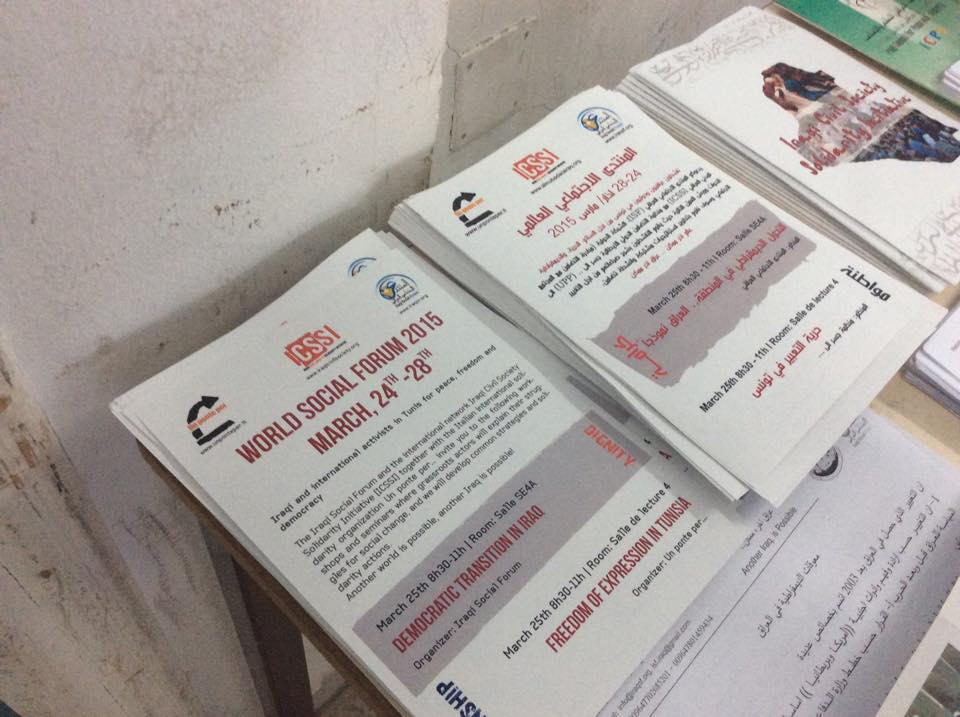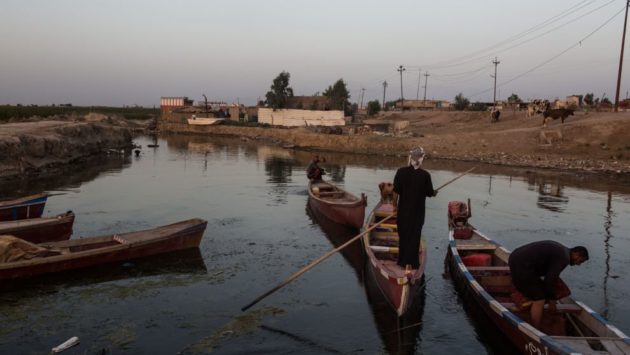Tolerance, Reconciliation, Law
Paper written for the Iraqi Social Forum participation in the WSF – Tunisia 2015.
By Hadi Aziz Ali, Judge and legal researcher.
Bertrand Russell says: “The moral thing I want to say is very simple: I’d like to say that love is wisdom and hatred is imbecility. In this world that is more and more closely correlating, we should learn to tolerate each other; and if we want to live together not die together, we should learn a sort of kindness and tolerance.” That’s why tolerance means the acceptance and respect of the cultural richness; this acceptance and respect is not a concession or a gift–it is more of recognition of others to enjoy human rights and basic freedoms acknowledged by international legitimacy. It is not a moral generosity when you prevent yourself from violent intrusion against people who don’t share your convictions, because tolerance is transformed from individual tendency to legislative reality of the human rights provisions that were included in international covenants and conventions; it became a part of the legal system of the majority of countries, including Iraq.
Tolerance
Tolerance does not mean that one should give up or slacken one’s beliefs or impose others’ beliefs and values on oneself. One gets to hold on to her beliefs, and so do others. The state has an active role in developing the principles on tolerance within a legislative system that guarantees justice and prevents discrimination, exclusion, or intolerance. In that regard, English philosopher and Enlightenment thinker John Locke stated that tolerance is synonymous to all that is just–state and citizens should believe in it for security and general order reasons. This means that tolerance can’t be achieved except through the institutional foundation especially made for this reason and compatible with the Declaration of Principles on Tolerance of the General Conference of UNESCO, Paris, 16 Nov 1995, that summarizes tolerance as follows: “Tolerance is harmony in difference.”
On the other hand, the absence of tolerance, contempt for others, not acknowledging cultural diversity and religion freedom, and the sense of superiority toward others will definitely mean political disturbance and the prevalence of hatred and violence. We can consider what has happened in Iraq since 2003 up to the present as proof.
Reconciliation
National reconciliation can be defined in several ways. Consider the following: The operation of national consensus on which a relationship between political and social parties can be built, based on tolerance values, to remove the remnants of the past, through definite clear mechanisms, according to some procedures, aiming to reach a meeting point. It is also defined in a general sense: National consensus aiming to the convergence of the different points of view between opponents or disputed parties, through reaching an acceptable solution for the mistakes, violations, and crimes through dialogue and tolerance with the past according to the general provisions of human rights. It is legally defined in Article 698 of Civil Law as follows: Reconciliation is a contract that removes dispute and ends adversarial with consent. In that meaning, reconciliation meets with tolerance–despite the difference in language and terminology–in many common ways, including the tendency of individuals, groups, or foundations to respect others’ choices, convictions, and values, as well as standing with the victims and the necessity of mending the damage. According to the above, we give these remarks:
- Resort to transitional justice through a political approach to build the state after the eradication of the authoritarian regimes. Many countries went through this stage, such as South Africa, several Eastern European countries, Rwanda, Argentina, and others. Each one of these countries has its own ideas and applications in reconciliation with the past, through investigative committees that investigate the violations that the citizens suffered, whether in exclusion, marginalization, or violence, and through working out methods to mend the damage and the mechanism to get past this stage, with documenting the procedures taken with great care since they are part of the country’s memory. Iraq, after the invasion of 2003, resorted to classic justice (court justice) instead of transitional justice, where a special court was established that carried out prosecutions of previous regime figures. This type of justice was enhanced by the legislation of Baath eradication that was issued by the Coalition Provisional Authority (CPA), which later became the Justice and Accountability Act, which means that those who were in the government never proposed reconciliation.
- National reconciliation was proposed by those who are in the government (in the new regime) and also by those who are not in the government after disputes, violent hatred, sectarianism, and the sense of exclusion by others had prevailed. Some parties, whether executive or legislative authorities, proposed reconciliation through the Reconciliation Committee with mobilizing civil society for the same purpose in order to reach an acceptable formula to converge divergent views. This issue was prolonged for more than a decade and never revealed a practical vision because of the absence of the real will to conclude this issue, autocratic tendencies, and the shallowness of proposed tribal solutions. Reconciliation is a systemic scientific work based on political, social, and other sciences; it can’t be accomplished according to the currently proposed solutions.
- The majority of the proposed ideas dealt with the political aspect of the issues in question, especially the political opponents of the political operation. But the discrimination aspect, including gender, ethnicity, color, religion, sect or belief was never considered, which means that reconciliation, if approved, it will slowly erode because it does not include everyone.
Law
1- Reconciliation cannot proceed solely through legislation or by organizing an entity or body or any (independent) formation to implement it–the current activities implemented by many Iraqi groups are carried out with no legal authorization, including the Reconciliation Committee. That’s why it lacks legal reference. The importance of the presence of legislation is a pressing matter. South Africa, for instance, before initiating the transitional stage, issued the National Unity Support Law in 1995, which–based upon the Truth and Reconciliation Committee–was established. According to the abovementioned law, reconciliation was made and South Africa went into the transitional stage according to the provisions of that law. It was the same in Morocco–the body that was assigned to this issue developed its own system; it was verified with a royal decision and published in the official newspaper on 10 Apr 2004. Based upon that system, the body commenced its work. This is what was followed in all countries that went through similar circumstances.
2- A comprehensive review of all Iraqi legislation must be done where all Iraqi legislation that legitimizes discrimination, whether against women or because of ethnic, religious, sectarian, faith, or any other reason, must be reconsidered. Such legislation occupies a large area of the Iraqi legislative fabric; thus, there should be appropriate solutions to eradicate this discrimination. We can’t speak of reconciliation and tolerance with the presence of legislative foundation for discriminationز
3- Activate provisions contained in the international covenants, charters, and conventions, which are ratified in Iraq according to law and were legislated for that purpose. Stop approaching them as the West’s goods that are designed to undermine our heritage; prioritize them over the national legislations since the executive and legislative authorities signed to commit to these international provisions; and cancel the laws that are inconsistent with these provisions, which should be considered as Iraqi laws and are part of the Iraqi legislative system protected by Article 130 of the Iraqi Constitution. Any speech of national reconciliation cannot be established without activating these provisions–approach them as national laws, and those who violate them are breaking the law.
4- Make inventory of all national legislation that hinders or prevents the completion of reconciliation procedures—including obstructionist legislation that legitimately tears at the social fabric–and replace it with legislation that will enhance reconciliation (such as the General Amnesty Law) and review the Justice and Reliability Law since it is unacceptable for the latter law to prolong the transitional stage indefinitely.
5- Seek the completion of legislations that establish the required constitutional state, like the Political Parties Law, Freedom of Expression Law, Freedom of Journalism Law, Freedom of Gathering and Peaceful Demonstration Law, Federation Council Law, State Council of the Administrative Judiciary. Review the Council of Representatives Elections Law and other laws.




